Exercise 16
Rediscovering food
Difficulty level – 3 (difficult)
Time commitment : At every meal and throughout the day
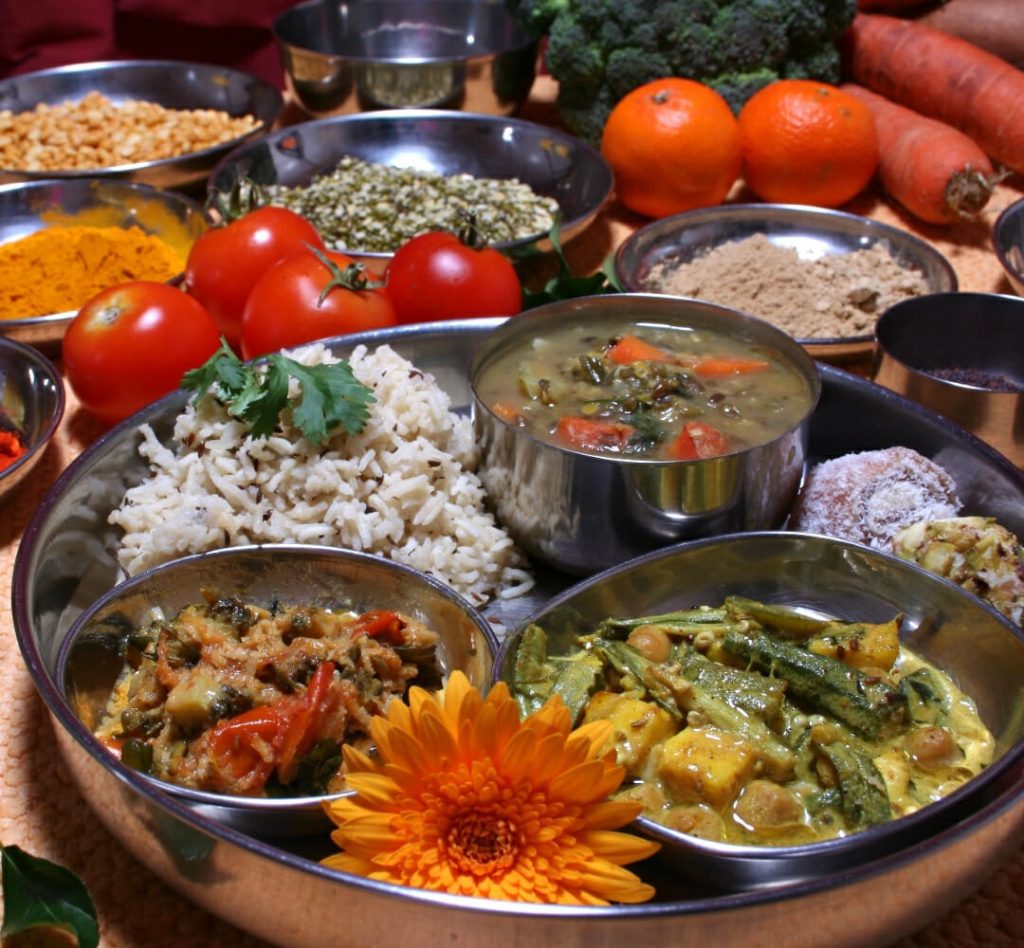
We have spoken about perspectives, basic breathing exercises, āsanā practice, meditation and mantra japa. All these steps are beneficial, but they don’t amount to much if you don’t take care of what you eat. We are an accumulation of food, the Anna-mayakosha, on the physical, mental and emotional levels. What you eat, shows on your body, comes out in the way you think and the emotions that you feel.
Hence, everything aside, rediscovering food first step that you take in your journey towards a better self.
A few points to note:
Read my earlier post on mindful eating (Exercise 8), and follow those instructions to the best of your ability. In addition:
- Commitment – To make a change, you have to commit wholeheartedly to it. These changes are tough to make, and food is most difficult to resist, because it engages all our senses. Habits can change, but you have to DECIDE to change them first.
- Vegetarian – The 21-day sādhanā requires you to be vegetarian. If you cannot resist, then try reducing non-vegetarian food in stages in week 1 (strictly no red meat), and then be vegetarian for the next two weeks. This is essential, since your body would need some time to show you the changes that come from a different diet.
- Fresh – Consume your food a maximum of two hours after preparing it. This may be tough, given your work commitments, but try to follow this as much as possible, for maximum benefits.
- Avoid – Processed foods of any kind, including frozen foods. Also avoid white sugar (can be substituted with jaggery), fruit juices (have the fruit instead), fizzy drinks (colas and other aerated drinks), syrupy drinks (they are mostly sugar), instant noodles (yes, this will be difficult) and canned foods (loaded with preservatives).
- Involve your family – Mealtimes should be family–time. It is tough to cook separately just for one person, so to involve them in the exercise as well, but be mindful of their choices. Don’t force it on them.
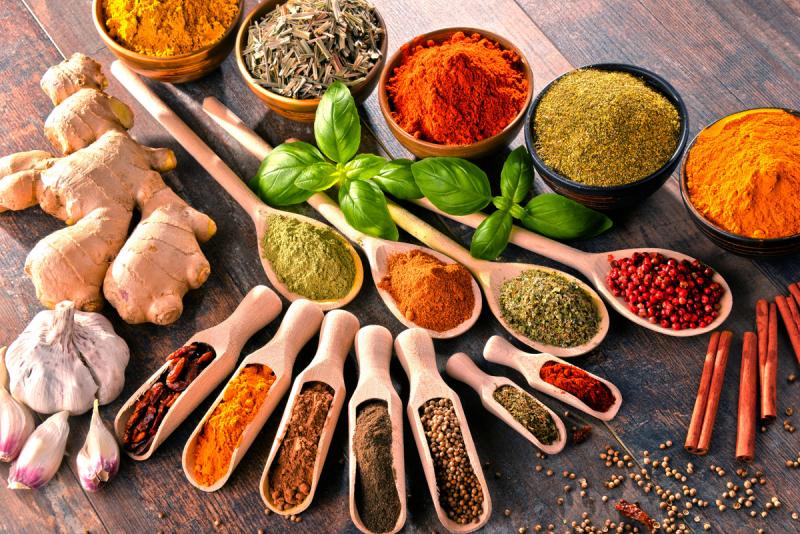
How you do it
I have not included any suggested foods or recipes, since this is a preparatory course. What follows are guidelines on proper eating throughout the sādhanā.
The objective is to change some unhealthy habits, and recognise the effect that good food has on your body.
You would have to read my earlier post on mindful eating, and then come to this, so that you can eat mindfully at every meal.
Eat warm water when you wake up
The first thing that you need to do when you wake is to eat warm water. I said eat deliberately – the process (always) has to be deliberate, taking a sip, swishing it around your mouth, and then gently letting it down the throat. Gulping down water (and food) does no good to your body. You can add a dash of lemon if you need. Ideally, sit in vajrasana when sipping the water. This āsanā helps stimulate the digestive tract, and together with the warm water stimulates your insides, the gastrointestinal tract, and helps with motions that follow.
Eat warm water throughout the day
Avoid cold water, even in summer. Sipping warm water throughout the day stimulates your insides, aids digestion, relieves cold and congestion, and calms the central nervous system. There are no stipulated number of glasses or amount of water that you need to consume. Try to ‘listen’ to your body, and adjust accordingly.
Number of meals
Ideally two meals, with light snacks (nuts, curds, buttermilk) in between. If you have to take three meals, then at fixed times, with lunch being the heaviest (relatively speaking) and dinner being the lightest. Avoid rice, chapatis, or any form of carbohydrates at dinner. Try to have a light salad and fruits instead.
Fasting
Depending on the day you start the sādhanā, there would be 1-2 days of fasting. We usually time the fasting according to phases of the moon, calculated as the eleventh day after the new and full moons (Ekādaśi). Here is a list of the dates for 2020.
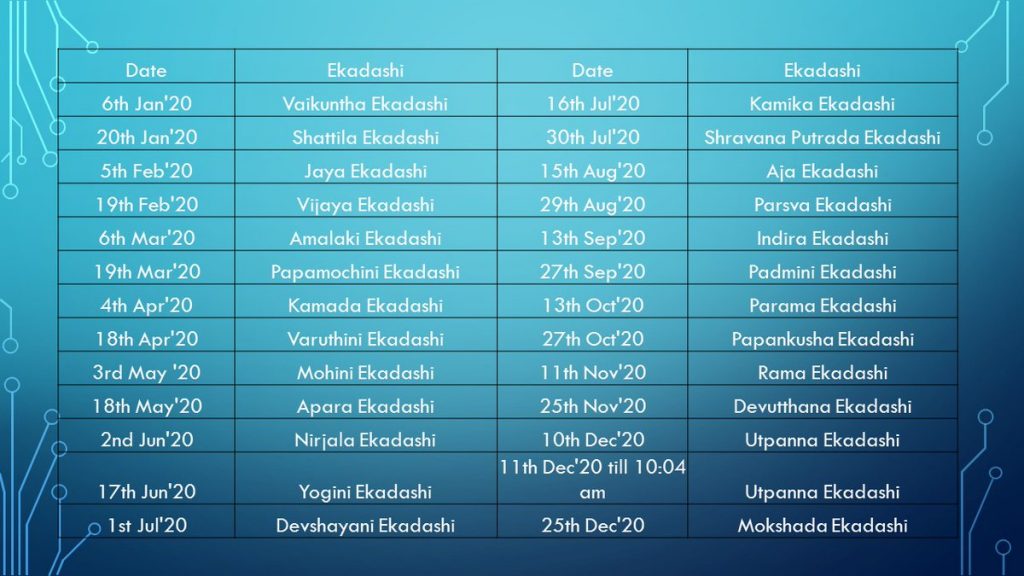
On these days, you can have light fruits (when you feel the hunger pangs) and warm water throughout the day. Start and sunrise, and break the fast after 24 hours. Ease into the normal food routine – which means the first meal you have after the fast will be very light, and then moderation as always required.
Type of food
Āyurveda recommends foods of six tastes – Sweet (Madhura), Sour (Amla), Salty (Lavana), Pungent (Katu), Bitter (Tikta) and Astringent (Kashaya). Click here to see some examples.
Try to include these six tastes in your daily diet during the sādhanā.
Order of food
A chapter in the Sushruta Samhita, one of the main texts of Ayurveda, deals with the order of tastes involved in a meal.According to it, you should have a sweet at the outset, something sour and salty in the middle, followed by pungent, bitter and astringent foods. Eating dessert at the end means that the empty calories and sugar suppress the digestive fire, causing fermentation and indigestion thanks to the acid produced. It’s not uncommon to experience bloating in this case.
Tea and Coffee

This is a tough one. Reduce your intake of caffeine (yes, tea contains caffeine too) by half in the first week, and try to avoid it in the next two weeks. If this is impossible, have light tea or coffee in the middle of the day (not when you wake up, and not after 3 pm). This is the most difficult part of this exercise (I speak from my own experience), but once you are through, you will understand how dependent these drinks make your body, and you will be able to use them strategically (for a quick energy boost) rather than as a habit. I also recommend herbal teas, flavoured green teas and camomile teas, brewed from tea leaves (avoid the tea bags).
Drink your food, and chew your water…
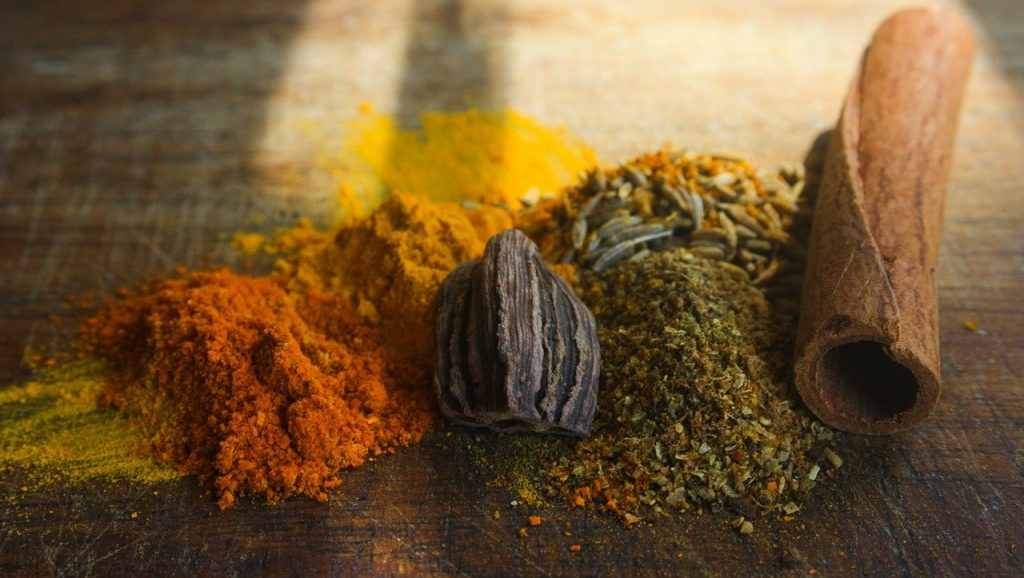
Part of this extract is a repost – I felt that it is important to read this again, and again, to ensure that we understand the importance of food.
You can live without your gadgets, without the car, without any of the ‘wants’ that we surround ourselves with, but we cannot live without food. We are but a an accumulation of food (Anna-maya-kosha).
अन्नाद्वै प्रजाः प्रजायन्ते । याः काश्च पृथिवीं श्रिताः । अथो अन्नेनैव जीवन्ति । अथैनदपि यन्त्यन्ततः ।
from food life springs forth, by food, it is sustained, and in food it merges when departed.
We work so hard so that we can put food on our plate – hence the adage ‘this is my bread and butter’, and not ‘this is my iPhone and car EMI’.
Yet we treat eating like a task – something that has to be completed in between our busy lives. We don’t give it respect, we don’t even see it while gulping it down. No wonder it doesn’t work well for us – the rate of rise of eating disorders and obesity stands testimony to our soured (pun intended) relationship with a basic need of ours – food.
The funny part is that we look around for diets to help us lose weight, or gain weight and in general, become healthier, without listening to our own body.
Have you ever seen an animal or a bird landing up at the local dietician? They are instinctive – they know when to eat, what to eat, and how much to eat. If they are not well, even the best food cannot tempt them. They never overeat – they know when to stop. We humans, on the other hand, are the oddest ‘evolved’ species – we pride ourselves on being more intelligent, self-aware and technologically advanced, so much that we treat the rest of nature as a divine gift that exists to serve us greater mortals…and we don’t even know how to eat!
This exercise will help bring back a lost relationship with food – it will be tough at first, since we have been doing this wrong for a large part of our lives. Listen to your body – it speaks to you, every day, every minute. It wants to you make the change.
Commit to making this change. Trust me, you will not be disappointed.
After some time, a very short time, you will begin to taste food better. You will begin to feel lighter. Much lighter. When you give your food the attention it deserves, you will feel healthier too. After all, this food is what will go on to BECOME YOU. And a healthier you can experience this world in a much more happy, engaging and beautiful way.
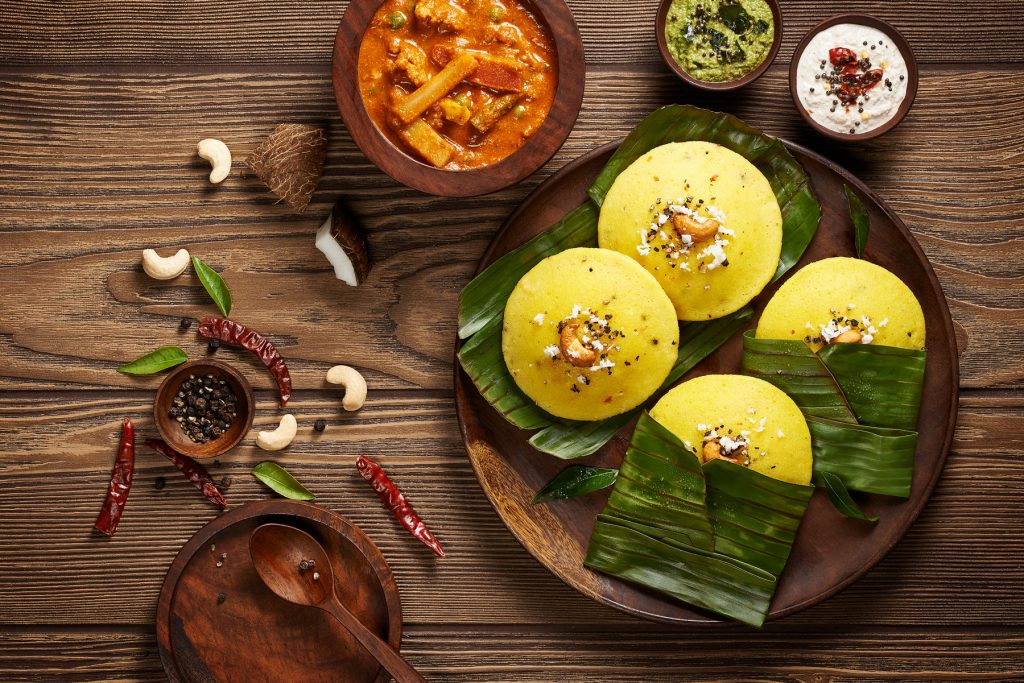
आहार शुद्धौ सत्त्व शुद्धिः
सत्त्व शुद्धौ ध्रुवा स्मृतिः
स्मृति लम्भे सर्व ग्रन्थीनांविप्र मोक्षः ||
āhāra-śuddhau sattva-śuddhiḥ
sattva-śuddhau dhruvāsmṛtiḥ
smṛtilambhe sarva-granthīnām vipramokṣaḥ
Chandogya Upanishad 7.26
If one eats pure food, one’s mind becomes pure. If the mind is pure, one’s memory becomes strong and steady. If the memory is good, one becomes free from all bondages.
